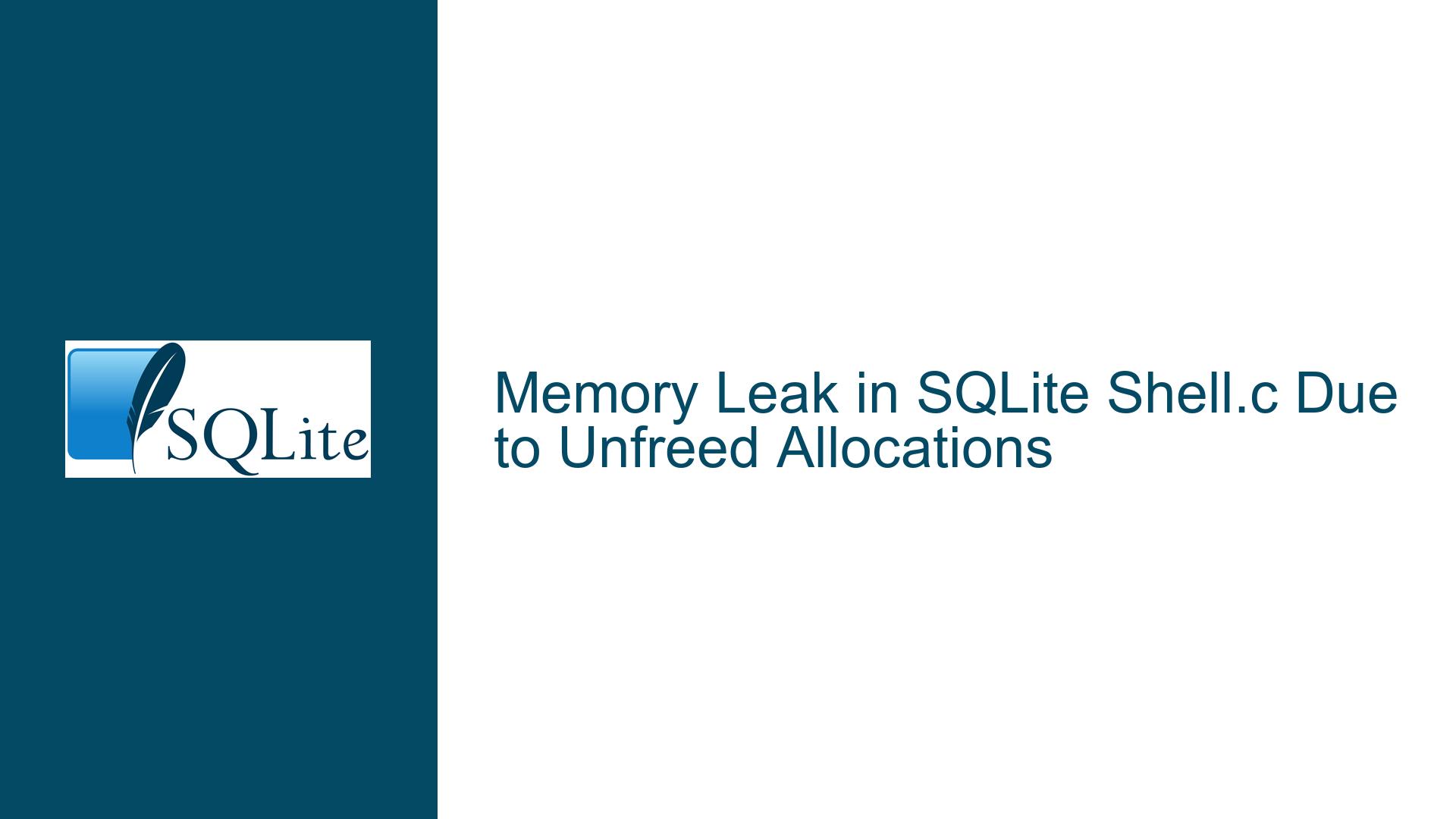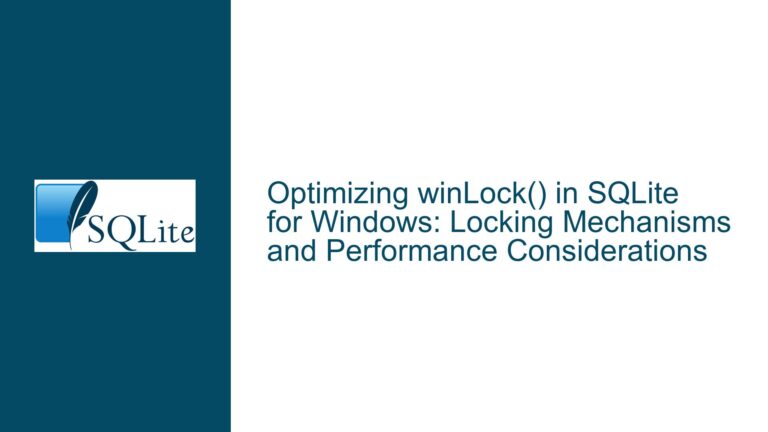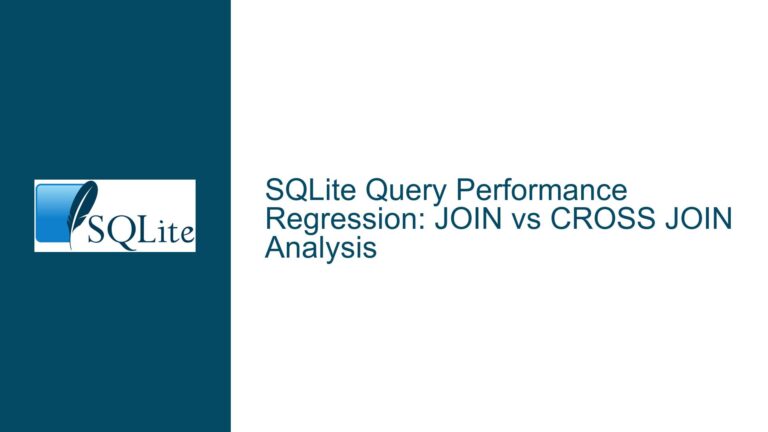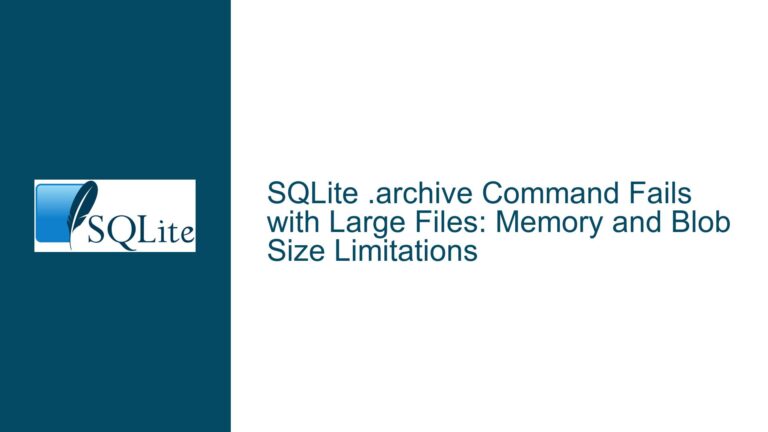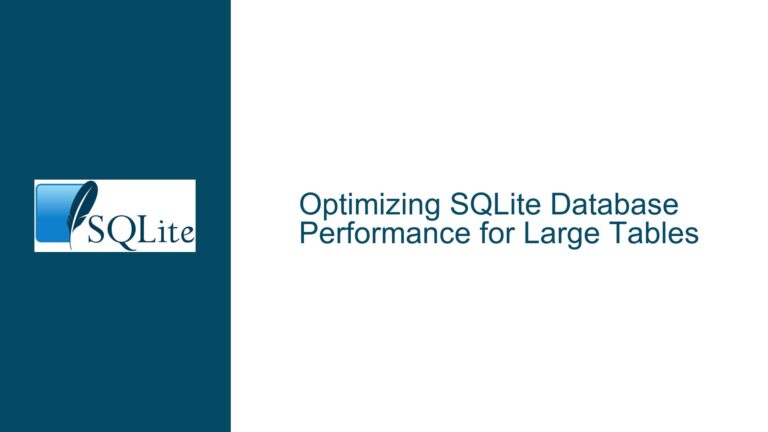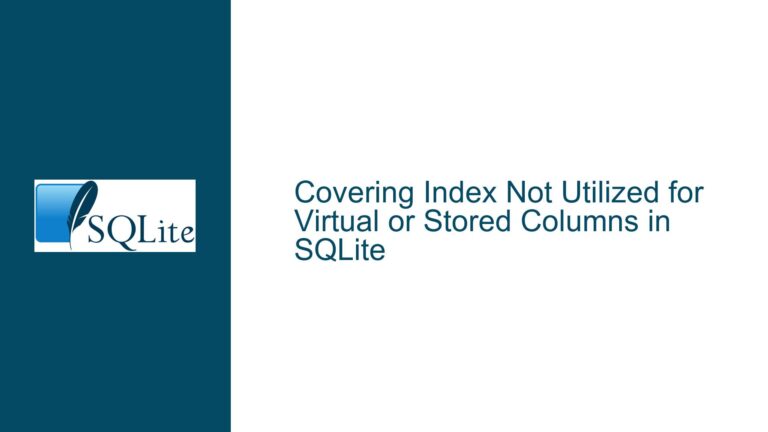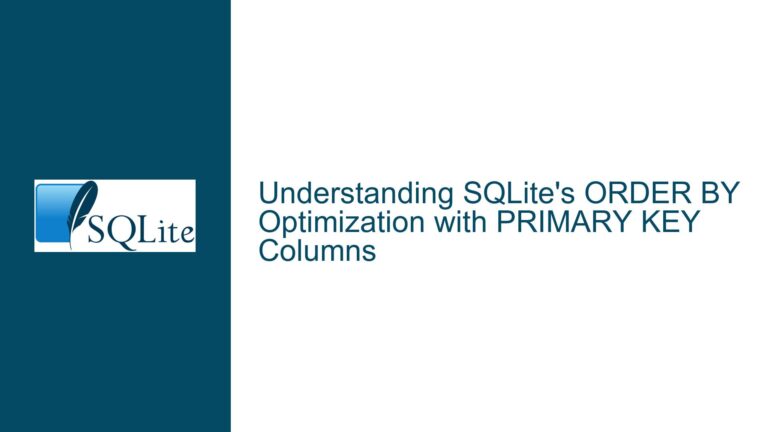Memory Leak in SQLite Shell.c Due to Unfreed Allocations
Memory Leak Detected in SQLite Shell.c During Import Operations
The core issue revolves around a memory leak detected in the SQLite shell utility, specifically within the shell.c file. The leak manifests during the execution of certain import operations, where dynamically allocated memory is not properly freed before the program exits. This issue was identified using AddressSanitizer (ASAN), a memory error detector for C/C++ programs, which reported a direct leak of 112 bytes in one instance and 104 bytes in another. The leak traces back to the sqlite3MemMalloc function, which is responsible for memory allocation within SQLite. The memory allocation occurs during the execution of the import_append_char function, which is part of the shell’s command processing logic.
The leak is particularly concerning because it occurs in a widely-used and well-vetted codebase like SQLite. The fact that it was detected by ASAN suggests that the issue is reproducible under specific conditions, particularly when handling certain inputs during import operations. The leak is not just a theoretical concern but has practical implications, as it can lead to increased memory consumption over time, especially in long-running processes or when handling large datasets.
The issue is further compounded by the fact that the leak persists across different versions of SQLite, including the latest version at the time of the report (3.32.1). This indicates that the problem is not a recent regression but has likely been present in the codebase for some time. The leak is triggered during the execution of meta-commands in the SQLite shell, specifically when processing input that involves importing data. The memory allocation occurs in the import_append_char function, which is called during the execution of the do_meta_command function. The allocated memory is not freed before the program exits, leading to the reported memory leak.
Improper Handling of Memory Allocation in Error Paths
The root cause of the memory leak lies in the improper handling of memory allocation during error paths in the SQLite shell’s command processing logic. Specifically, when an error occurs during the execution of a meta-command, the program jumps to an exit label (meta_command_exit) using a goto statement. However, before jumping to the exit label, the program fails to free the memory allocated for the sCtx.z buffer, which is used to store intermediate data during the import operation. This oversight results in a memory leak, as the allocated memory is never freed before the program exits.
The issue is exacerbated by the fact that the error handling logic in the SQLite shell does not consistently free allocated memory before jumping to the exit label. In the case of the import_append_char function, the memory allocated for the sCtx.z buffer is not freed when an error occurs, leading to the reported memory leak. This is a common issue in C programs, where error handling paths often involve complex control flow, and it is easy to overlook the need to free allocated memory before exiting.
The problem is further complicated by the fact that the memory allocation occurs deep within the call stack, making it difficult to track and manage all allocated memory. The sqlite3MemMalloc function, which is responsible for allocating memory, is called indirectly through several layers of function calls, making it challenging to ensure that all allocated memory is properly freed before the program exits. This is particularly problematic in error paths, where the program may need to free multiple allocations before exiting.
The issue is also related to the use of goto statements in the error handling logic. While goto statements can be useful for simplifying error handling, they can also make it difficult to ensure that all allocated memory is properly freed before exiting. In this case, the goto statement is used to jump to the meta_command_exit label when an error occurs, but the program fails to free the sCtx.z buffer before jumping to the exit label. This results in a memory leak, as the allocated memory is never freed.
Implementing Proper Memory Management in Error Paths
To address the memory leak, it is necessary to ensure that all allocated memory is properly freed before the program exits, particularly in error paths. This involves modifying the error handling logic in the SQLite shell to ensure that the sCtx.z buffer is freed before jumping to the meta_command_exit label. The following steps outline the necessary changes to fix the memory leak:
Identify All Error Paths: The first step is to identify all error paths in the SQLite shell’s command processing logic where memory is allocated but not freed before exiting. This involves reviewing the code to identify all instances where the program jumps to an exit label using a
gotostatement and ensuring that all allocated memory is properly freed before jumping to the exit label.Free Allocated Memory Before Exiting: Once all error paths have been identified, the next step is to modify the error handling logic to ensure that all allocated memory is properly freed before jumping to the exit label. In the case of the
import_append_charfunction, this involves adding a call tosqlite3_free(sCtx.z)before jumping to themeta_command_exitlabel.Audit the Code for Similar Issues: After fixing the memory leak in the
import_append_charfunction, it is important to audit the rest of the code for similar issues. This involves reviewing the code to identify all instances where memory is allocated but not freed before exiting, particularly in error paths. Any identified issues should be fixed by ensuring that all allocated memory is properly freed before exiting.Test the Changes: Once the necessary changes have been made, it is important to test the modified code to ensure that the memory leak has been fixed and that no new issues have been introduced. This involves running the code with ASAN enabled to verify that no memory leaks are detected and that the program behaves as expected.
The following code snippet shows the necessary changes to fix the memory leak in the import_append_char function:
Index: src/shell.c.in
==================================================================
--- src/shell.c.in
+++ src/shell.c.in
@@ -8042,10 +8042,11 @@
}
sqlite3_free(zSql);
if( rc ){
if (pStmt) sqlite3_finalize(pStmt);
utf8_printf(stderr,"Error: %s\n", sqlite3_errmsg(p->db));
+ sqlite3_free(sCtx.z);
xCloser(sCtx.in);
rc = 1;
goto meta_command_exit;
}
nCol = sqlite3_column_count(pStmt);
@@ -8071,10 +8072,11 @@
rc = sqlite3_prepare_v2(p->db, zSql, -1, &pStmt, 0);
sqlite3_free(zSql);
if( rc ){
utf8_printf(stderr, "Error: %s\n", sqlite3_errmsg(p->db));
if (pStmt) sqlite3_finalize(pStmt);
+ sqlite3_free(sCtx.z);
xCloser(sCtx.in);
rc = 1;
goto meta_command_exit;
}
needCommit = sqlite3_get_autocommit(p->db);
This patch ensures that the sCtx.z buffer is freed before jumping to the meta_command_exit label, thereby fixing the memory leak. The changes are relatively simple but have a significant impact on the program’s memory management, ensuring that all allocated memory is properly freed before exiting.
In addition to fixing the memory leak, it is also important to consider the broader implications of the issue. Memory leaks can have serious consequences, particularly in long-running processes or when handling large datasets. They can lead to increased memory consumption, which can in turn lead to performance degradation or even program crashes. Therefore, it is important to take memory leaks seriously and to ensure that all allocated memory is properly freed before exiting.
To prevent similar issues from occurring in the future, it is important to adopt best practices for memory management in C programs. This includes:
Consistent Error Handling: Ensure that all error paths in the program consistently free allocated memory before exiting. This can be achieved by using a common error handling mechanism that ensures all allocated memory is properly freed before exiting.
Code Reviews: Conduct regular code reviews to identify and fix memory management issues. Code reviews can help identify issues that may not be immediately apparent, particularly in complex codebases.
Static Analysis: Use static analysis tools to identify potential memory management issues in the code. Static analysis tools can help identify issues such as memory leaks, use-after-free errors, and other common memory management issues.
Dynamic Analysis: Use dynamic analysis tools such as ASAN to identify memory management issues at runtime. Dynamic analysis tools can help identify issues that may not be apparent during static analysis, particularly in complex code paths.
By adopting these best practices, it is possible to prevent memory leaks and other memory management issues from occurring in the future, ensuring that the program remains robust and reliable.
In conclusion, the memory leak in the SQLite shell’s shell.c file is a serious issue that can lead to increased memory consumption and performance degradation. The issue is caused by improper handling of memory allocation in error paths, where allocated memory is not properly freed before exiting. By implementing proper memory management practices and ensuring that all allocated memory is properly freed before exiting, it is possible to fix the memory leak and prevent similar issues from occurring in the future.
